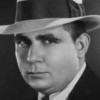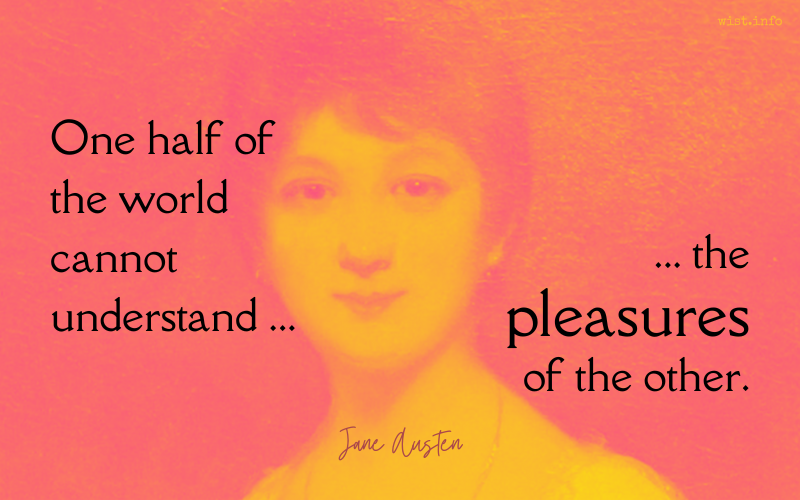Indeed, if we consider the unblushing promises of reward and the staggering nature of the rewards promised in the Gospels, it would seem that Our Lord finds our desires not too strong, but too weak. We are half-hearted creatures, fooling about with drink and sex and ambition when infinite joy is offered us, like an ignorant child who wants to go on making mud pies in a slum because he cannot imagine what is meant by the offer of a holiday at the sea. We are far too easily pleased.
Quotations about:
pleasure
Note not all quotations have been tagged, so Search may find additional quotes on this topic.
‘T is pity though, in this sublime world, that
Pleasure’s a sin, and sometimes sin’s a pleasure.
He shrugged his shoulders. “I have known many gods. He who denies them is as blind as he who trusts them too deeply. I seek not beyond death. It may be the blackness averred by the Nemedian skeptics, or Crom’s realm of ice and cloud, or the snowy plains and vaulted halls of the Nordheimer’s Valhalla. I know not, nor do I care. Let me live deep while I live; let me know the rich juices of red meat and stinging wine on my palate, the hot embrace of white arms, the mad exultation of battle when the blue blades flame and crimson, and I am content. Let teachers and priests and philosophers brood over questions of reality and illusion. I know this: if life is illusion, then I am no less an illusion, and being thus, the illusion is real to me. I live, I burn with life, I love, I slay, and am content.”
Do not bite at the bait of pleasure till you know there is no hook beneath it.
Thomas Jefferson (1743-1826) American political philosopher, polymath, statesman, US President (1801-09)
Letter to Maria Cosway (12 Oct 1786)
(Source)
The pleasure arising from an extraordinary agitation of the mind is frequently so great as to stifle humanity; hence arises the entertainment of the common people at executions, and of the better sort at tragedies.
The high sentiments always win in the end, the leaders who offer blood, toil, tears, and sweat always get more out of their followers than those who offer safety and a good time. When it comes to the pinch, human beings are heroic.
You will find that he takes care never to say or do anything, that can be construed into a slight, or a negligence; or that can, in any degree, mortify people’s vanity and self-love; on the contrary, you will perceive that he makes people pleased with him by making them first pleased with themselves: he shows respect, regard, esteem and attention, where they are severally proper: he sows them with care, and he reaps them in plenty.
Lord Chesterfield (1694-1773) English statesman, wit [Philip Dormer Stanhope]
Letter to his son, #214 (18 Jan 1750)
(Source)
On a proper role model to imitate.
He is the true conqueror of pleasure, who can make use of it without being carried away by it, not he who abstains from it altogether.
Aristippus of Cyrene (c. 435 – c. 356 BC) Cyrenaic philosopher, Hedonist
Fragment 53
(Source)
Alt. trans.:
- "The one to master pleasure is not he who abstains but he who employs it without being carried away by it -- just as being a master of a ship or of a horse is not abstaining from using them, but directing them where one wishes." (Fragment 55 Mannebach) (Stob. Ecl. 3.17 17
- "The master of pleasure is not he who abstains from it, but he who uses it without being carried away by it."
Business and pleasure, rightly understood, mutually assist each other, instead of being enemies, as silly or dull people often think them. No man tastes pleasures truly who does not earn them by previous business; and few people do business well who do nothing else.
Lord Chesterfield (1694-1773) English statesman, wit [Philip Dormer Stanhope]
Letter to his son, #189 (7 Aug 1749)
(Source)
Do as you would be done by, is the surest method that I know of pleasing. Observe carefully what pleases you in others, and probably the same thing in you will please others.
Lord Chesterfield (1694-1773) English statesman, wit [Philip Dormer Stanhope]
Letter to his son, #129 (16 Oct 1747)
(Source)
A common theme in Chesterfield's advice, e.g.:
Letter #144 (9 Mar 1748):
Observe carefully, then, what displeases or pleases you in others, and be persuaded, that, in general, the same things will please or displease them in you.
Letter #229 (9 Jul 1750):
Pleasure is necessarily reciprocal; no one feels, who does not at the same time give it. To be pleased, one must please. What pleases you in others, will in general please them in you.
There is a certain dignity to be kept up in pleasures, as well as in business.
Lord Chesterfield (1694-1773) English statesman, wit [Philip Dormer Stanhope]
Letter to his son, #216 (5 Feb 1750)
(Source)
Anything I like is either illegal or immoral or fattening.
Alexander Woollcott (1887-1943) American critic, commentator, journalist, wit
(Attributed)
Apparently a gag attributed by Woollcott to a Frank Rand of St. Louis on his radio show in September 1933; it was then directly attributed to Woollcott in Reader's Digest in Dec. 1933. It is sometimes cited to Woollcott's essay "The Knock at the Stage Door," The North American Review (Sep 1922), but not found there.
Variants:More discussion about this quotation:
- "All the things I like to do are either immoral, illegal, or fattening."
- "All the things I really like to do are either immoral, illegal or fattening."
- "Everything I want to do is either illegal, immoral or fattening."
Why do men delight in work? Fundamentally, I suppose, because there is a sense of relief and pleasure in getting something done — a kind of satisfaction not unlike that which a hen enjoys on laying an egg.
H. L. Mencken (1880-1956) American writer and journalist [Henry Lewis Mencken]
Minority Report: H.L. Mencken’s Notebooks, #34 (1956)
(Source)
Next to enjoying ourselves, the next greatest pleasure consists in preventing others from enjoying themselves, or, more generally, in the acquisition of power. Consequently those who live under the dominion of Puritanism become exceedingly desirous of power.
Yet many men, being slaves to appetite and sleep, have passed through life untaught and untrained, like mere wayfarers. In these men we see, contrary to Nature’s intent, the body a source of pleasure, the soul a burden.
[Sed multi mortales dediti ventri atque somno, indocti incultique vitam sicuti peregrinantes transegere.]
Sallust (c. 86-35 BC) Roman historian and politician [Gaius Sallustius Crispus]
Bellum Catilinae [The War of Catiline; The Conspiracy of Catiline], ch. 2, sent. 8 [tr. Rolfe (1931)]
(Source)
Original Latin. Alt. trans.:
"Yet we see in the mass of life numbers addicted to sloth and the gratifications of appetite; men uneducated and uninformed, who have passed their time like incurious travellers, of whom it may be said, the organs of bodily sensation were their delight, and their minds were no better than a burden." [tr. Murphy (1807)]
"Yet many there are in the world who, abandoned to sloth and sensuality, without learning or politeness, pass their lives much like travellers; and who, in opposition to the design of nature, place their whole happiness in animal pleasure, looking on their minds as a heavy burden." [tr. Rose (1831)]
"But many men abandoned to their belly and sleep, untaught and uneducated, have spent their days like strangers, whose body in truth, contrary to nature, has been their happiness, their soul a burden." [Source (1841)]
"Yet many human beings, resigned to sensuality and indolence, uninstructed and unimproved, have passed through life like travelers in a strange country; to whom, certainly, contrary to the intention of nature, the body was a gratification, and the mind a burden." [tr. Watson (1867)]
"Many, however, the slaves of gluttony and sloth, without learning or cultivation, have passed through life as though it were a journey in a foreign land, and thus, in defiance of nature, have actually found their body a pleasure and their real vital powers a burden." [tr. Pollard (1882)]
"But many mortals, devoted to their stomachs and to sleep, have passed through life untaught and uncouth, like foreign travellers; and of course, contracy to nature, their bodies were a source of pleasure to them, their minds a burden." [tr. Woodman (2007)]
Who loves not wine, women, and song
Remains a fool his whole life long.[Wer nicht liebt Weib, Wein und Gesang,
A Der bleibt ein Narr sein Leben lang.]
The first thing that happens to men once they have had to give up any pleasure, whether for propriety’s sake, or from satiety, or for their health, is to condemn it in other people. Such behavior implies a sort of attachment to the very things one has just renounced: we want nobody else to enjoy the good things that we have lost; it is a feeling of jealousy.
[La première chose qui arrive aux hommes après avoir renoncé aux plaisirs, ou par bienséance, ou par lassitude, ou par régime, c’est de les condamner dans les autres. Il entre dans cette conduite une sorte d’attachement pour les choses mêmes que l’on vient de quitter; l’on aimerait qu’un bien qui n’est plus pour nous ne fût plus aussi pour le reste du monde: c’est un sentiment de jalousie.]
Jean de La Bruyère (1645-1696) French essayist, moralist
The Characters [Les Caractères], ch. 11 “Of Mankind [De l’Homme],” § 112 (11.112) (1688) [tr. Stewart (1970)]
(Source)
(Source (French)). Alternate translations:
The first thing men do, when they have renounc'd pleasure, either out of decency, surfeit, or conviction, is to condemn it in others. This sort of management is however seldom free from a particular affection for those very things they left off, but they would have no body enjoy the pleasure they can no longer enjoy themselves, which proceeds more from Jealousie than any thing else.
[Bullord ed. (1696)]
The first thing Men do, when they have renounc'd Pleasure, either out of Decency, Surfeit, or Conviction, is to condemn it in others. They preserve, in this Conduct, a sort of Affection for the very things they left off; they would have no body enjoy the Pleasure they can no longer enjoy themselves: 'Tis a sentiment of Jealousy.
[Curll ed. (1713)]
The first Thing, when Men have renounced Pleasure, either out of Decency, Satiety, or Necessity, is to condemn it in others. This Sort of Reproof, however, is not free from a latent Affection for their forsaken Pleasures; they would interdict to all others what they can themselves no longer enjoy; their Admonitions are the Snarlings of Jealousy, not the Dictates of Purity.
[Browne ed. (1752)]
The first thing men do when they have renounced pleasure, through decency, lassitude, or for the sake of health, is to condemn it in others. Such conduct denotes a kind of latent affection for the very things they left off; they would like no one to enjoy a pleasure they can no longer indulge in; and thus they show their feelings of jealousy.
[tr. Van Laun (1885)]
There is a delight in meeting the eyes of one to whom one has just done a kindness.
[Il y a du plaisir à rencontrer les yeux de celui à qui l’on vient de donner.]
Jean de La Bruyère (1645-1696) French essayist, moralist
The Characters [Les Caractères], ch. 4 “Of the Heart [Du Coeur],” § 45 (4.45) (1688) [tr. Stewart (1970)]
(Source)
Commonly paraphrased, "The finest pleasure is kindness to others." It is interesting how some of the translations lean into the idea of performing a kindness being a pleasure, and others the obligation that kindness leverages.
(Source (French)). Alternate translations:
There is a pleasure to meet the Eyes of a person that we have lately oblig'd.
[Bullord ed. (1696)]
There is a pleasure in meeting the Eyes of a Person whom we have lately oblig'd.
[Curll ed. (1713)]
There is a pleasure to meet the Eyes of a Person whom we have lately obliged.
[Browne ed. (1752)]
There is a pleasure in meeting the glance of a person whom we have lately laid under some obligations.
[tr. Van Laun (1885)]
With health, everything is a source of pleasure; without it, nothing else, whatever it may be, is enjoyable; even the other personal blessings, — a great mind, a happy temperament — are degraded and dwarfed for want of it. So it is really with good reason that, when two people meet, the first thing they do is to inquire after each other’s health, and to express the hope that it is good; for good health is by far the most important element in human happiness.
[Mit ihr wird alles eine Quelle des Genusses: hingegen ist ohne sie kein äußeres Gut, welcher Art es auch sei, genießbar, und selbst die übrigen subjektiven Güter, die Eigenschaften des Geistes, Gemütes, Temperaments, werden durch Kränklichkeit herabgestimmt und sehr verkümmert. Demnach geschieht es nicht ohne Grund, daß man vor allen Dingen sich gegenseitig nach dem Gesundheitszustande befragt und einander sich wohlzubefinden wünscht: denn wirklich ist dieses bei weitem die Hauptsache zum menschlichen Glück.]
Arthur Schopenhauer (1788-1860) German philosopher
Parerga and Paralipomena, Vol. 1, “Aphorisms on the Wisdom of Life [Aphorismen zur Lebensweisheit],” ch. 2 “What a Man Is [Von dem, was einer ist]” (1851) [tr. Saunders (1890)]
(Source)
(Source (German)). Alternate translation:
In general, however, nine-tenths of our happiness depends on health alone. With it everything becomes a source of pleasure, whereas without it nothing, whatever it may be, can be enjoyed, and even the other subjective blessings, such as mental qualities, disposition, and temperament, are depressed and dwarfed by ill-health. Accordingly, it is not without reason that, when two people meet, they first ask about the state of each other's health and hope that it is good; for this really is for human happiness by far the most important thing.
[tr. Payne (1974)]
God Almighty first planted a garden. And indeed it is the purest of human pleasures.
Francis Bacon (1561-1626) English philosopher, scientist, author, statesman
“Of Gardens,” Essays, No. 46 (1625)
(Source)
Religions, which condemn the pleasures of senses, drive men to seek the pleasures of power. Throughout history, power has been the vice of the ascetic.
Bertrand Russell (1872-1970) English mathematician and philosopher
New York Herald Tribune Magazine (1928-05-06)
(Source)
Morality turns on whether the pleasure precedes or follows the pain. Thus it is immoral to get drunk because the headache comes after the drinking. But if the headache came first and the drunkenness afterwards, it would be moral to get drunk.
Samuel Butler (1835-1902) English novelist, satirist, scholar
The Note-Books of Samuel Butler, “Morality” (1912)
Full text.
We are constantly railing against the passions; we ascribe to them all of man’s afflictions, and we forget that they are also the source of all his pleasures.
I wish to God that you had as much pleasure in following my advice, as I have in giving it [to] you.
Lord Chesterfield (1694-1773) English statesman, wit [Philip Dormer Stanhope]
Letter to his son, #216 (5 Feb 1750)
(Source)
IAGO: Pleasure and action make the hours seem short.
William Shakespeare (1564-1616) English dramatist and poet
Othello, Act 2, sc. 3, l. 400 (2.3.400) (1603)
(Source)
For he that makes any thing his chiefest good, wherein justice or virtue does not bear a part, and sets up profit, not honesty, for the measure of his happiness; as long as he acts in conformity with his own principles, and is not overruled by the mere dictates of reason and humanity, can never do the offices of friendship, justice, or liberality: nor can he ever be a man of courage, who thinks that pain is the greatest evil; or he of temperance, who imagines pleasure to be the sovereign good.
[Nam qui summum bonum sic instituit, ut nihil habeat cum virtute coniunctum, idque suis commodis, non honestate metitur, hic, si sibi ipse consentiat et non interdum naturae bonitate vincatur neque amicitiam colere possit nec iustitiam nec liberalitatem; fortis vero dolorem summum malum iudicans aut temperans voluptatem summum bonum statuens esse certe nullo modo potest.]
Marcus Tullius Cicero (106-43 BC) Roman orator, statesman, philosopher
De Officiis [On Duties; On Moral Duty; The Offices], Book 1, ch. 2 (1.2) / sec. 5 (44 BC) [tr. Cockman (1699)]
(Source)
Attacking the Epicurean "highest good" of avoiding pain and seeking personal detachment; Cicero supported the Stoic virtues of courage and moderation.
(Source (Latin)). Alternate translations:
He who teaches that to be the chief good which hath no connection with virtue, which is measured by personal advantage, and not by honor; if he be consistent with himself, and not sometimes overcome by the benignity of nature, can neither cultivate friendship nor practice justice nor liberality. That man cannot be brave who believes pain the greatest evil; nor temperate, who believes pleasure the supreme good.
[tr. McCartney (1798)]
For if a man should lay down as the chief good, that which has no connexion with virtue, and measure it by his own interests, and not according to its moral merit; if such a man shall act consistently with his own principles, and is not sometimes influenced by the good ness of his heart, he can cultivate neither friendship, justice, nor generosity. In truth, it is impossible for the man to be brave who shall pronounce pain to be the greatest evil, or temperate who shall propose pleasure as the highest good.
[tr. Edmonds (1865)]
For he who so interprets the supreme good as to disjoin it from virtue, and measures it by his own convenience, and not by the standard of right, -- he, I say, if he be consistent with himself, and be not sometimes overcome by natural goodness, can cultivate neither friendship, nor justice, nor generosity; nor can he possibly be brave while he esteems pain as the greatest of evils, or temperate while he regards pleasure as the supreme good.
[tr. Peabody (1883)]
He who severs the highest good from virtue and measures it by interest and not by honour, if he were true to his principles and did not at times yield to his better nature, could not cultivate friendship, justice or liberality; and no one can be brave who declares pain the greatest evil, or temperate who maintains pleasure to be the highest good.
[tr. Gardiner (1899)]
For he who posits the supreme good as having no connection with virtue and measures it not by a moral standard but by his own interests -- if he should be consistent and not rather at times over-ruled by his better nature, he could value neither friendship nor justice nor generosity; and brave he surely cannot possibly be that counts pain the supreme evil, nor temperate he that holds pleasure to be the supreme good.
[tr. Miller (1913)]
Take, for example, the man who has established the kind of highest good that has nothing to do with virtue, that is, measured by the individual's convenience, not by his morality. If that man is consistent and is not in the meantime overcome by natural goodness, he cannot cultivate friendship, or justice, or openness of character. In fact, a man of courage who considers pain the greatest evil, or a temperate man who declares indulgence to be the greatest good, is surely an impossible contradiction.
[tr. Edinger (1974)]
No man can be brave who thinks pain the greatest evil; nor temperate, who considers pleasure the highest good.
[Source]
If you pursue good with labor, the labor passes away but the good remains. If you pursue evil with pleasure, the pleasure passes away and the evil remains.
Marcus Tullius Cicero (106-43 BC) Roman orator, statesman, philosopher
(Attributed)
Widely attributed to Cicero, but no actual citations found. Sometimes the clauses are reversed:
If you pursue evil with pleasure, the pleasure passes away and the evil remains. If you pursue good with labor, the labor passes away but the good remains.
Thus in all things the greatest pleasures are only narrowly separated from disgust.
[Sic omnibus in rebus, voluptatibus maximis fastidium finitimum est.]
Marcus Tullius Cicero (106-43 BC) Roman orator, statesman, philosopher
De Oratore [On the Orator, On Oratory], Book 3, ch. 25 (3.25) / sec. 100 (55 BC) [tr. Rackham (1942)]
(Source)
(Source (Latin)). Alternate translations:
Thus, generally speaking, Loathing borders upon the most pleasing Sensations.
[tr. Guthrie (1755)]
Thus, generally speaking, satiety borders upon the most pleasing sensations.
[Source (1808)]
In all other things, loathing still borders upon the most exquisite delights.
[tr. Watson (1860)]
The extremes of gratification and disgust are separated by the finest line of demarcation.
[tr. Calvert (1870)]
In everything we do, all our keenest pleasures end in satiety.
[ed. Harbottle (1906)]
In everything else, then, the greatest pleasure borders on aversion.
[tr. May/Wisse (2001)]
One half of the world cannot understand the pleasures of the other.
Discretion is the salt, and fancy the sugar of life; the one preserves, the other sweetens it.
Christian Nestell Bovee (1820-1904) American epigrammatist, writer, publisher
Intuitions and Summaries of Thought, Vol. 1, “Discretion” (1862)
(Source)
Go, eat your bread in gladness, and drink your wine in joy.
The Bible (The Old Testament) (14th - 2nd C BC) Judeo-Christian sacred scripture [Tanakh, Hebrew Bible], incl. the Apocrypha (Deuterocanonicals)
Ecclesiastes 9:7 [JPS (1985)]
(Source)
Alternate translations:
Go thy way, eat thy bread with joy, and drink thy wine with a merry heart.
[KJV (1611)]
Go, eat your bread with joy and drink your wine with a glad heart.
[JB (1966)]
Go ahead -- eat your food and be happy; drink your wine and be cheerful.
[GNT (1976)]
Go, eat your bread with enjoyment and drink your wine with a merry heart.
[NRSV (1989 ed.)]
Simple pleasures are the last refuge of the complex.
Let everyone, then, do something, according to the measure of his capacities. To have no regular work, no set sphere of activity — what a miserable thing it is! How often long travels undertaken for pleasure make a man downright unhappy; because the absence of anything that can be called occupation forces him, as it were, out of his right element. Effort, struggles with difficulties! that is as natural to a man as grubbing in the ground is to a mole. To have all his wants satisfied is something intolerable — the feeling of stagnation which comes from pleasures that last too long. To overcome difficulties is to experience the full delight of existence.
[Inzwischen treibe jeder etwas, nach Maßgabe seiner Fähigkeiten. Denn wie nachteilig der Mangel an planmäßiger Tätigkeit, an irgend einer Arbeit, auf uns wirke, merkt man auf langen Vergnügungsreisen, als wo man, dann und wann, sich recht unglücklich fühlt; weil man, ohne eigentliche Beschäftigung, gleichsam aus seinem natürlichen Elemente gerissen ist. Sich zu mühen und mit dem Widerstande zu kämpfen ist dem Menschen Bedürfnis, wie dem Maulwurf das Graben. Der Stillstand, den die Allgenugsamkeit eines bleibenden Genusses herbeiführte, wäre ihm unerträglich. Hindernisse überwinden ist der Vollgenuß seines Daseins.]
Arthur Schopenhauer (1788-1860) German philosopher
Parerga and Paralipomena, Vol. 1, “Aphorisms on the Wisdom of Life [Aphorismen zur Lebensweisheit],” ch. 5 “Counsels and Maxims [Paränesen und Maximen],” § 2.17 (1851) [tr. Saunders (1890)]
(Source)
(Source (German)). Alternate translation:
Nevertheless, everyone should do something according to the measure of his abilities. For on long pleasure-trips we see how pernicious is the effect on us of not having any systematic activity or work. On such trips we feel positively unhappy because we are without any proper occupation and are, so to speak, torn from our natural element. Effort, trouble, and struggle with opposition are as necessary to man as grubbing in the ground is to a mole. The stagnation that results from being wholly contented with a lasting pleasure would be for him intolerable. The full pleasure of his existence is in overcoming obstacles.
[tr. Payne (1974)]
DEBAUCHEE, n. One who has so earnestly pursued pleasure that he has had the misfortune to overtake it.
Ambrose Bierce (1842-1914?) American writer and journalist
“Debauchee,” The Cynic’s Word Book (1906)
(Source)
Included in The Devil's Dictionary (1911).
Originally published in the "Devil's Dictionary" column in the San Francisco Wasp (1881-12-02).

































